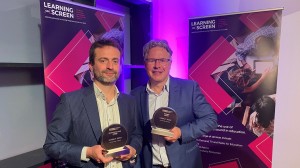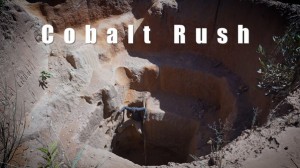A documentary made by a team from the University of Bath highlighting the challenges faced by African cobalt miners has won two national film awards.
Cobalt Rush, produced in-house by university development scholar Prof Roy Maconachie, filmmaker Simon Wharf and Dr Bossissi Nkuba, a specialist in mining governance from the Democratic Republic of Congo (DRC), won the Best Educational Film Award and the prestigious Premier Award at the Learning on Screen Awards 2023.

The 20-minute film was shot on location in Lualaba and Haut-Katanga Provinces in the DRC and sheds light on the gruelling conditions artisanal operators must endure, while at the same time exploring universal themes of ambition, hope and the obligation to make ends meet.
Pictured: Simon Wharf, left, and Prof Roy Maconachie
In 2021 the DRC was responsible for approximately three-quarters of the world’s entire production of cobalt, with southern Congo sitting atop an estimated 3.4m metric tons – almost half the world’s known supply.
Cobalt compounds are used in the electrodes for lithium-ion-based batteries, demand for which has soared over recent years given the increase in popularity for electric vehicles.

Cobalt Rush received perfect scores from the Learning on Screen Awards judging panel, who described it as “clear and powerful” and “an absolutely outstanding film” in awarding it the Premier Award.
“Cobalt Rush explores themes of hope, resilience and survival in the lives of three poor cobalt miners in the DRC,” they added.
“As they negotiate dismal circumstances, our own complex relationship with green technologies becomes apparent, and the invisible side of global cobalt demand is revealed.”
The judges also praised the composition of the film’s production team, which they said contributed to its authenticity, as well as the excellent evocation of the landscape and environment.

Prof Maconachie said: “Almost a third of cobalt extraction in the DRC is carried out by an informal workforce of artisanal miners, called creuseurs.
“Many operate illegally on the outskirts of large-scale mining operations, with little or no safety equipment. They face perilous working conditions, human rights abuses and are paid poverty wages, but they still find hope and ambition.
“This film gives voice to these creseurs and it’s been a privilege to work with them and help them tell their stories."
Simon Wharf, from the from the university’s Audio Visual unit, added: “Winning the Best Educational Film Award was fantastic but winning the Premier Award for best film in the entire competition has blown me away.
“The quality of the other films was so high that I come away with an enforced sense that this is such an important story that will resonate with many audiences.”
Dean of the Faculty of Humanities & Social Sciences, Prof Deborah Wilson, said to win two film awards among really stiff competition was a tremendous achievement for Roy, Simon and Bossissi.
“The team have produced a documentary which has got people really thinking about the issue, and I’m delighted they have been recognised in this way,” she added.
Cobalt Rush builds on previous projects from Maconachie and Wharf, including Voices from the Mine, which explored artisanal diamond industry supply chains, and Gender and Fairtrade, which focused on conditions for female cocoa farmers in Ghana.
The annual Learning on Screen Awards awards provide a platform for generations of upcoming student filmmakers as well as celebrating a wide range of educational broadcast and professional productions,
This year’s awards were presented at a ceremony at the British Film Institute (BFI) on London’s Southbank.



















